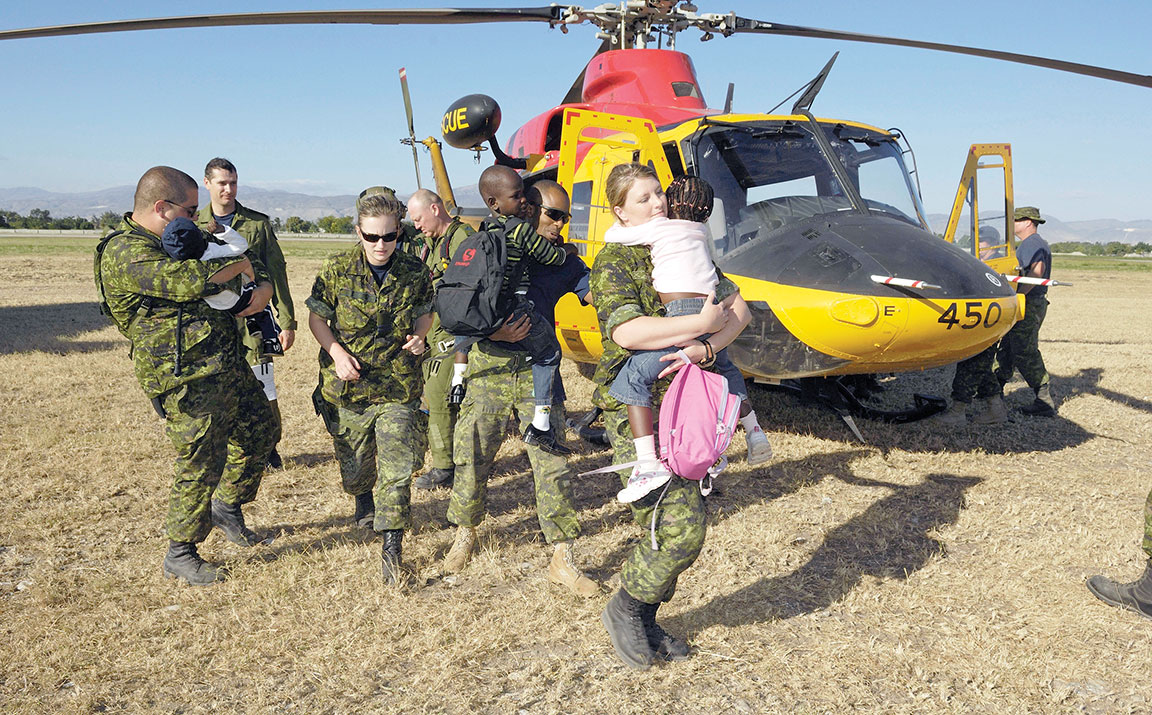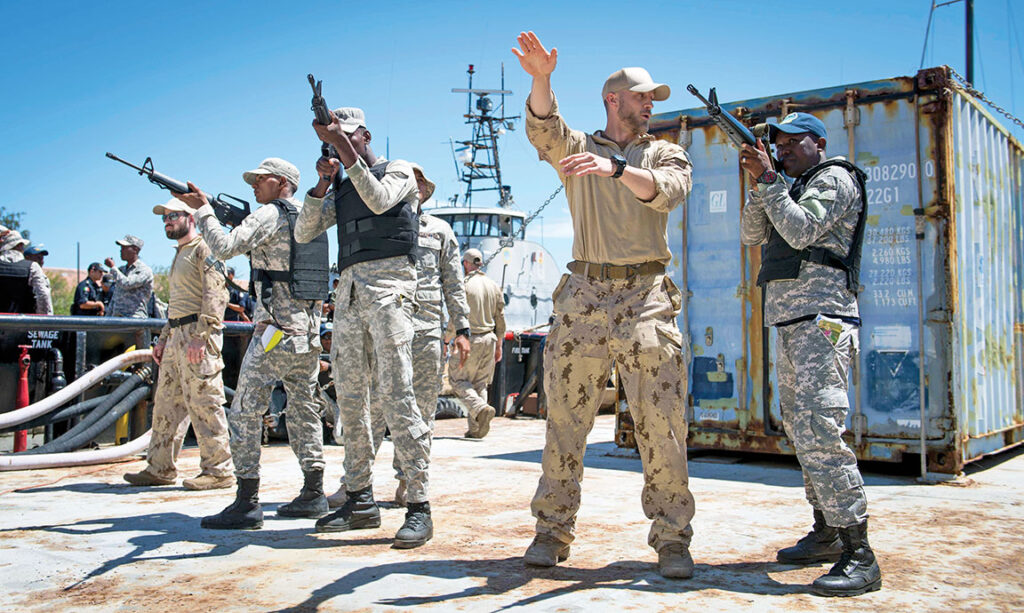A member of the Canadian Naval Tactical Operations Group demonstrates techniques on how to secure a ship’s perimeter to Dominican Navy personnel during Exercise Tradewinds 19. CANADIAN ARMED FORCES
CANADIAN JOINT OPERATIONS COMMAND
The defense of Canada and the rest of North America are the top priorities of the Canadian government and the Canadian Armed Forces (CAF). As a geographical approach to the continent and home to numerous allies and partners, the Caribbean is a region of particular importance. It is one with both opportunities and challenges in security, commerce, immigration, tourism, investment and strategic competition. We continue to see malign and non-state actors engage in illegal, destructive activities and remain concerned regarding episodic and enduring humanitarian crises that continue to impede development. The ongoing partnerships between the CAF and our Caribbean regional partners remains of critical importance.
Canada’s defense policy reinforces the CAF’s commitment to work collaboratively with partners throughout the hemisphere to develop regional capabilities, encourage operational flexibility and foster deeper military-to-military ties while learning from each other. Continuous cooperation and engagement are critical to meeting the security and defense challenges of the region, which include humanitarian assistance and disaster relief (HADR); the illegal movement of drugs, people, weapons, and money; and other transnational organized crime activities.
The CAF has a long tradition of security cooperation and humanitarian assistance in the Caribbean. During the past eight decades, the CAF has participated in many exercises such as Exercise Tradewinds, which focuses on countering threats, building partnerships and improving HADR capabilities. The Global Affairs Canada-funded Operation Ackee and its annual capstone Exercise Tropical Dagger aims to consistently enhance the existing skill sets of Special Forces in the region in their attempts to disrupt organized crime and gang-related activities. Moreover, the CAF has conducted more than 50 operations spanning HADR, stabilization and security efforts, and the restoration of critical infrastructure within the region. The CAF has also contributed to capacity building under the Military Training and Cooperation Program (MTCP) by helping to establish the Caribbean Military Academy School of Aviation, the Caribbean Counter-Terrorism Training Centre and the Caribbean Military Academy School of Maritime Studies.
Beyond professionalization efforts and responses to natural disasters and other emergencies, the CAF collaborates with partners throughout the Caribbean to counter the illegal movement of narcotics. The region is a major transit area for illicit drugs that enter Canada and the U.S. and generate $100 billion to $130 billion for transnational criminal organizations. Canada’s contribution to the U.S.-led counternarcotics operations in the Caribbean Sea and the eastern Pacific Ocean is called Operation Caribbe. Since November 2006, the CAF has deployed maritime surveillance and air assets on a rotational basis to support the multinational campaign against illicit trafficking under Joint Interagency Task Force South.

Operation Caribbe missions nest within a multinational and interagency framework. For example, in November 2022, members of the Royal Canadian Navy, along with members of the Canadian Coast Guard, helped the United Nations Office on Drugs and Crime conduct training to help Jamaica, the Dominican Republic, and Trinidad and Tobago to strengthen their maritime domain awareness capability through sharing knowledge and expertise on the use of unmanned aerial systems for reconnaissance of the maritime domain.
To enhance Canada’s presence in the region and improve stability and security, the CAF established an operational support hub for Latin America and the Caribbean in Kingston, Jamaica, in 2016. This hub enables rapid response to missions in the area, including the rapid deployment of CAF and allied forces, in addition to the provision of effective operational support to HADR operations. The hub continues to strengthen the relationship between the CAF and important regional security actors, such as the Jamaican Defence Force.
The CAF’s most recent Caribbean initiative is the Framework for Western Hemisphere Allied Collaboration (F-WHAC). The F-WHAC aims to synchronize and coordinate allied efforts to improve regional stability and align strategic goals throughout Latin America and the Caribbean. Building on previous allied coordination efforts, the F-WHAC was established as a mechanism to serve as a standing multinational, cross-functional, consultative body focused on identifying strategic responses to regional problem sets.
Canada’s commitments in the Caribbean facilitate international partnerships, information sharing, training opportunities, cooperative security, and increase collective understanding of the risks in the region. The evolving threat posed by strategic competitors in the Caribbean, as well as the destabilizing impact of illegal activities, transcend national borders and undermine continental defense. Countering these global threats demands active engagement with our partners abroad. Whether conducting Operation Caribbe, HADR or building partner capacity through the MTCP and other ventures such as Operation Ackee and the F-WHAC, Canada and the CAF are committed to their allies and partners. A strong and secure Caribbean is essential to a strong and secure North America.

